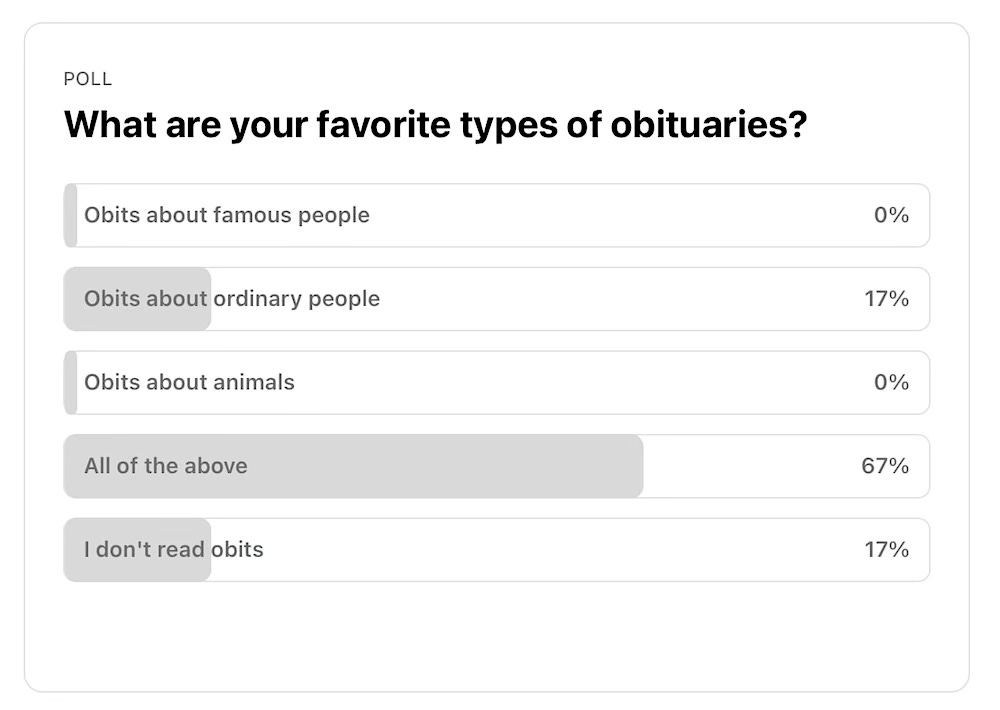"In the end, we’ll all become stories." --Margaret Atwood
NEWS & NOTES
Talk about a great source
One of the most difficult parts of writing obituaries is trying to craft a story about someone who can't tell you anything about their life. Since the subject of the article is dead, the journalist must rely on family, friends and colleagues to create a portrait of the deceased. Rarely does the deceased have the opportunity to have the last word.
There are, of course, exceptions to the rule. Many larger newspapers will assign obituary writers to interview famous subjects and pre-write their obits. The story is then placed in the "morgue" (a.k.a. filing cabinet or database) and held until the subject dies. At that point, the story is edited, updates are added and it's published.
Gary Miles, who writes obituaries for The Philadelphia Inquirer, recently received an email from a future subject. Carol Saline is a retired, award-winning senior writer and editor for Philadelphia Magazine, a bestselling author, a TV and radio personality and a popular public speaker. She's also dying and she wanted Miles to know so her family wouldn't have to worry about dealing with the task of answering questions about her while they’re grieving.
Saline also had a request.
“I wanted you to know me,” she wrote, “not only my accomplishments but who I am as a person.”
FMI: Click here.
A classical way to deal with bereavement
There is no right way to grieve. Some prefer to mourn in groups, sharing each other's memories and experiences. Others opt to grieve alone, dealing with the pain day by day, or even hour by hour. Many choose to throw themselves into work or a special project -- anything to make the loss recede for just a little while.
For 14-year-old AV Ter, who lost her mother and sister in the D.C. plane crash last January, the Steinway piano in her living room provided both a place to mourn and to escape.
Journalist Dana Munro's profile of AV is both elegant and heartbreaking. Take 15 minutes and give it a read/listen. I promise; it’s time well spent.
How do you want to die?
SUPPORT THE END FILES
The End Files is a reader-supported newsletter featuring news about death, grief, funerals and obituaries. Subscriptions are only $5/month, or $50/year. Everyone who purchases a subscription will be automatically entered into a monthly giveaway for books, gift certificates and other prizes.
WEEKLY POLL
LAST WEEK’S POLL
NOTABLE OBITS
* Barry Benepe, an urban planner who helped launch the largest farmers market network in the U.S., died. He was 96. In the 1970s, Benepe helped to organize New York City’s first farmer's market. His colleague, Robert A. Lewis, joined the cause by reaching out to farmers and persuading them to sell their fresh wares in the urban jungle. The first market at East 59th Street and Second Avenue in Manhattan was such a huge success that today there are more than 34 markets spread across five boroughs. (Trip Gabriel, The New York Times)
* Chef Anne Burrell, 55, a beloved fixture on the Food Network, died. Burrell graduated from the Culinary Institute of America, attended the Italian Culinary Institute for Foreigners, and then returned to the states to work at several New York restaurants. But with her brash cooking style, wild white-blond hair and love of food, Burrell made an immediate impression on TV audiences. She served as sous-chef to Mario Batali on the show “Iron Chef America,” and was a contestant on the first season of the "Chopped All-Stars Tournament." She also hosted or co-hosted numerous shows, including “Secrets of a Restaurant Chef,” “Worst Cooks in America" and “Chef Wanted With Anne Burrell." (Pat Saperstein, Variety and Priya Krishna, The New York Times)
* Bookseller and author Joel Fram died at 81. Fram wrote numerous books, including "Weird Cures: Medical Treatments Ever (The Most Hilarious, Disgusting and Downright Dangerous)” and “Slip of the Tongue: Offhand Remarks That Ended High-Flying Careers.” He was the founder of the bookshop, Eeyore's Books for Children, on New York City’s Upper West Side and its second branch on the Upper East Side. Both stores closed in 1993 due to competition from Barnes & Noble superstores opening in the neighborhoods. (Shannon Maughan, Publishers Weekly)
* Koyo Kouoh, art curator and executive director of Zeitz MOCAA in Cape Town, one of Africa’s largest contemporary art museums, died at 75. Born in Cameroon, Kouoh originally helped migrant women as a social worker. But after she became a mother, Kouoh moved to Senegal and started working as an independent art curator. Kouoh was supposed to oversee next year's Venice Biennale but she died just days before announcing its theme and title. With the full support of her family, the Venice Biennale has decided to carry out her vision of the project under the title: In Minor Keys. (Alex Marshall and Roslyn Sulcas, The New York Times)
* Writer William Langewiesche, 70, who wrote for The Atlantic, The New York Times Magazine and Vanity Fair, died. Known as the "Steve McQueen of journalism," Langewiesche won the National Magazine Award twice: in 2002 for “The Crash of EgyptAir 990,” about a flight that went down in the Atlantic Ocean, and in 2007 for “Rules of Engagement,” about the killing of 24 unarmed civilians by U.S. Marines in Haditha, Iraq. (The New York Times)
* Leonard Lauder, 92, who spent six decades at his family's cosmetics business and helped to transform it into a global giant, died. Lauder was the oldest son of Estée and Joseph Lauder, who founded The Estée Lauders Cos. in 1946. Lauder served as president from 1972 to 1995, chief executive from 1982 to 1999 and chairman from 1995 to 2009. Although the company went public in 1995, members of the Lauder family still own about 84% of the voting power of common stock. (The Associated Press)
* Mike “The Body Snatcher” McCallum, 68, the first Jamaican-born boxing champion, died. McCallum earned his nickname in the ring by repeatedly punching opponents in the body and head. He recorded 36 KOs — and was never knocked out himself. McCallum also won world titles at super welterweight, middleweight and light heavyweight. He retired in 1997 and was inducted into the International Boxing Hall of Fame six years later. (Steve Henson, Los Angeles Times)
* Ophthalmologist David Paton, who came up with an ingenious way to treat blindness in far-flung places, died. He was 94. While teaching at the Wilmer Eye Institute at Johns Hopkins University in the early 1970s, Paton became frustrated by the difficulty of treating preventable blindness in developing countries. So he converted a United Airlines jet into the Flying Eye Hospital and used it to transport volunteer surgeons around the world. Once on site, the traveling doctors and nurses would treat patients in the plane's onboard operating room and recovery area, and train local physicians in the aircraft's classroom. Paton chronicled his life and adventures in the 2011 memoir, “Second Sight: Views From an Eye Doctor’s Odyssey." (Michael S. Rosenwald, The New York Times)
* Indian tiger conservationist Valmik Thapar has died. He was 72 or 73. Thapar was just 10 years old when he encountered his first tiger while riding atop an elephant. In his 20s, Thapar studied under Fateh Singh Rathore, the field director and resident tiger expert at the Ranthambhore Tiger Reserve. There Thapar tracked tiger behavior, photographed and filmed the big cats and became a staunch advocate for them. Thapar would eventually write several books on the efforts to save tigers from poachers and shrinking habitats. (Richard Sandomir, The New York Times)
FAMOUS DEATHS IN HISTORY

On June 23, virologist/developer of the first polio vaccine Jonas Salk (80), TV producer Aaron Spelling (83) and actor Peter Falk (83)
On June 24, former President Grover Cleveland (71), actor/comedian Jackie Gleason (71) and Lonesome George (the last known Pinta Island tortoise, c. 100)
On June 25, actress Farrah Fawcett (62), fashion photographer Bill Cunningham (87) and Olympic swimmer Bill Woolsey (87)
On June 26, philosopher/journalist Max Stirner (49), British publisher/writer Ford Madox Ford (65) and director/screenwriter Nora Ephron (71)
On June 27, historian Shelby Foote (88), General George Patton IV (80) and actor Jack Lemmon (76)
On June 28, former President James Madison (85), screenwriter/TV host Rod Serling (50) and Canadian one-legged distance runner Terry Fox (22)
On June 29, biologist Thomas Henry Huxley (70), Swiss/German painter Paul Klee (60) and actress Katharine Hepburn (96)
On June 30, guitarist Chet Atkins (77), actor/comedian Buddy Hackett (78) and children's writer Robert McCloskey (88)
RECOMMENDED SUBSTACK
FAMOUS LAST WORDS
"I'm shot...it's over." --Anton Webern after he was shot by a U.S. soldier during the Allied occupation of Austria
MOMENT OF GRATITUDE
Thanks to zeferli@gmail.com, The Philadelphia Inquirer, The Washington Post, Alua Arthur, TED, YouTube, The Death Deck, the Pew Center for Arts & Heritage, Variety, Publishers Weekly, La Biennale Di Venezia, Sam Chui, the Los Angeles Times, Marek Studzinski, Unsplash, On This Day, Playback.FM, Britannica: This Day in History, Time and Date, Wikipedia, The Written Word, Chicken Fried Mascara, Canva and Deposit Photos for art and story suggestions.
Title quote is from Alua Arthur.
KEEP IN TOUCH
Have you discovered some interesting death-related news? Read a great obituary? Or do you know of someone we should interview? Reach out:
Like this newsletter? Please forward it to your friends and encourage them to subscribe.










